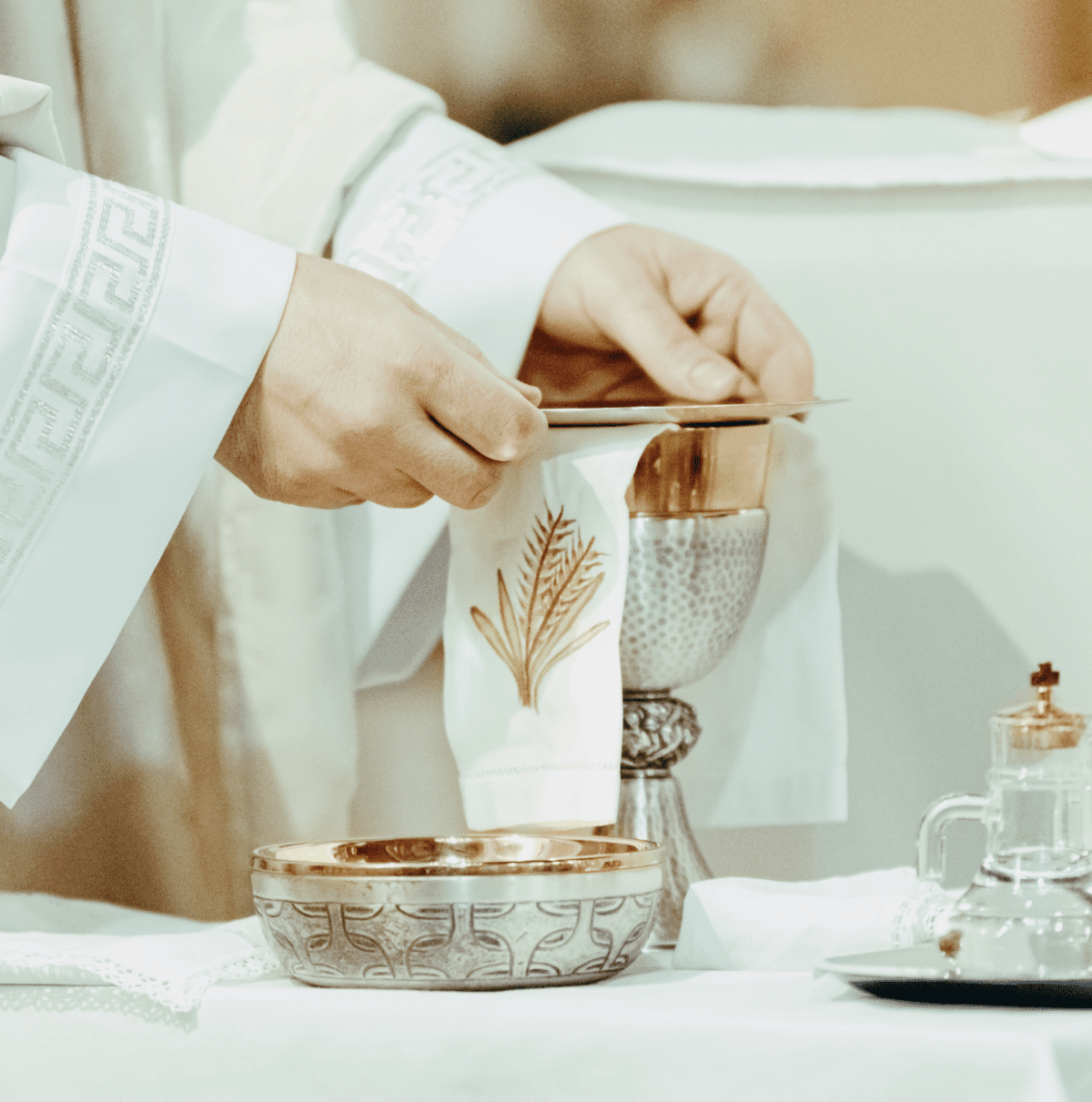50 Years:
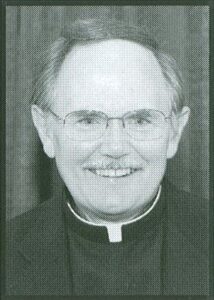 Father Joseph Pinchock
Father Joseph Pinchock
Father Joseph Pinchock is a native Floridian born in Orlando, Florida one of two children of John and Helen Pinchock. He attended schools in Orlando and later in Miami where the family had relocated. Feeling a call to missionary work in Africa, he attended seminary after graduating from high school and was ordained on January 29, 1972 in the Society of African Missions. He served in Africa for several years followed by vocations work in Boston and Chicago. He was assigned to serve in Florida and arrived at St. Charles Borromeo Parish in Orlando in 1980 where he also taught at Bishop Moore High School. In 1989 he was assigned as a full-time chaplain for campus ministry at Stetson University in Deland. Father Pinchock was incardinated into the Diocese of Orlando in 1993. He served at St. James Cathedral 1993-1994, St. Joseph Parish in Winter Haven 1994-2001, as Pastor of St. John the Baptist Parish in Dunellon 2001-2005, back to St. Joseph Parish 2005-2008, and finally as pastor of Our Lady of Hope Parish in Port Orange 2008-2011 when he retired.
25 Years:
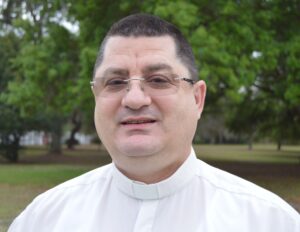 Father Augusto Cadavid
Father Augusto Cadavid
Father Augusto Cadavid was born in 1972 in Antioquia, Colombia, South America, part of a small but very faithful family consisting of his father, mother and sister. He describes the town he grew up in as very traditional and very Catholic. His formative years, both at school and at home, were guided by faithful family members, teachers, and friends. During his last two years of high school at the Minor Seminary of Saint John Eudes, a new voice began to guide Father Cadavid’s life in a different direction, a voice from the radio.
“My priestly vocation began to be born through the influence of an excellent Colombian preacher, the most illustrious Monsignor Augusto Trujillo Arango, Archbishop of Tunja, to whom I listened on the radio, especially during Holy Week,” remembers Father Cadavid, who heard in the Archbishop’s words a personal call from God. “My vocation was born from the oasis of preaching and by the sense of hearing, as the letter to the Romans says: ‘Thus faith comes from what is heard, and what is heard comes through the word of Christ’” (Romans 10:17).
Following high school, he continued his studies at the major seminary and was ordained a priest on December 12, 1997, the feast of Our Lady of Guadalupe. During the last 25 years, he had the opportunity to serve in his home diocese and as a missionary to the Diocese of Málaga—Soatá in Colombia, the Diocese of Honolulu in Hawaii and the Diocese of Orlando, where he continues to serve today. Since 2011, Father Cadavid has been the parochial vicar at Blessed Sacrament Parish in Clermont and at the Mission of Santo Toribio Romo, in Mascotte, where he is responsible for the Hispanic ministry. He also celebrates the Spanish Mass weekly at St. Lawrence Parish in Bushnell. No matter where his vocation takes him, or what work he is assigned, Father Cadavid says celebrating the Mass is the best part of being a priest.
“How wonderful to be able to celebrate the Holy Mass,” says Father Cadavid, remembering the words of the saint for whom his seminary was named, “As Saint John Eudes teaches especially us, priests: ‘For us to offer a Eucharist well it would take three eternities: one to prepare, another one to celebrate and a third one to give thanks.’”
Reflecting on the last decade he has spent in the Diocese of Orlando, Father Cadavid is especially thankful for the community and priests who have supported him along the way.
“I have always been very grateful for the help of our Bishop John Noonan, who to me has been an exemplary father and good shepherd,” says Father Cadavid. “My gratitude also to all the priests of our Diocese of Orlando for welcoming me and helping me. My gratitude for the help and kindness of those who have been my immediate superiors, Father Bob Webster and Father Mark Wajda.”
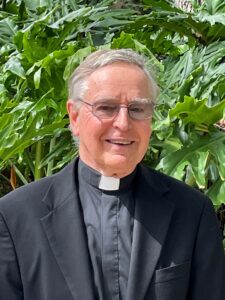 Father Augustine Clark
Father Augustine Clark
Father Augustine Clark was born in 1951 in the United Kingdom and grew up in a Church of England family. At 16 he felt a vocation to ministry – to the disappointment of his father who wanted him to take over his law practice- and was ordained an Anglican priest in 1976 at Canterbury Cathedral.
“During my studies at Oxford, particularly learning about the history of the Church, I had felt attracted to the Catholic faith,” said Father Clark, “so in 1978 I was received into the Catholic Church, something I’ve never regretted.”
Father Clark was sent to the Venerable English College in Rome for further studies to enter the Catholic priesthood. During that time, he met Saint Pope John Paul II, was awarded a papal gold medal by the Pontifical Gregorian University and was asked to consider a career in the Vatican diplomatic corps. He was on track to be ordained a priest in the summer of 1981, when instead he left the seminary and worked as a teacher in Italy. As a layman, Father Clark continued with higher theological studies and later taught high school religion in England before joining Downside Abbey as a Benedictine monk in 1992, working in the Abbey’s school as a teacher and house master for ten years.
“I much enjoyed the Benedictine blend of work and prayer” Father Clark said, “and after solemn vows early in 1997 I was ordained priest on October 4th – just 16 years late!”
In 2001, following a chance meeting, Father Clark was invited by Father John Murray to assist at St. Teresa Parish in Titusville, which he did during school vacations for three years. After so many years in the academic field, he loved the experience of regular pastoral work. In 2004, Bishop Norbert Dorsey invited him to come permanently to the Diocese of Orlando. He spent a year back in Titusville and then became parochial vicar of Holy Cross Parish in Orlando for three years, learning Spanish to serve the community better. He also served as Pastor at St. Charles Borromeo Parish in Orlando for six years and Nativity Parish in Longwood, where he remained until his retirement in 2019. He was incardinated to the Diocese of Orlando in 2009.
As a priest, Father Clark has always taken time to prepare homilies, to visit the sick and to counsel people in need. He has been involved in Hispanic, Lebanese, Vietnamese, Filipino and Caribbean ministry and much appreciates the diverse make-up of our Diocese. Though technically retired, Father Clark continues to minister to the community.
“In retirement I am happy to help at local parishes, walking to Annunciation every day to celebrate or concelebrate Mass if I am not celebrating elsewhere. The Eucharist has always been the center of my Catholic and priestly life, the stability in my varied journey. I also spend a lot of time hearing confessions,” said Father Clark. “With no family in this country, I consider the parish communities to be like a family and still keep in touch with many former parishioners. I am enormously grateful for their prayers and warm friendship.”
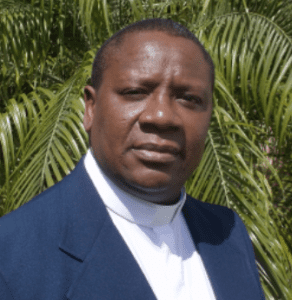 Father Titus Kachinda
Father Titus Kachinda
Father Titus Kachinda was born in a rural section of central Tanzania and is the seventh of 10 children. He says, “I have been brought up in a Christian family to which much of my pastoral ministry owes a lot to its fundamental Christian culture in my nurturing.” He attended Bihawana Junior Seminary, St. Anthony Major Seminary, and St. Paul Senior Seminary. He was ordained to the priesthood on November 23, 1997. He served in a parish for two years and after obtaining a Certificate for Accounts and Bachelor of Business Administration in Finance degree he served the majority of the next 20 years in financial administrative positions for the Diocese of Singida, including as a financial controller. Father Kachinda also served as Rector of a Preparatory Seminary. In 2014, he happily returned to parish work serving as a pastor in a parish in his diocese.
In 2016, Father Kachinda arrived in the Diocese of Orlando to serve as parochial vicar at St. Ann Parish in Debary followed by Prince of Peace Parish in Ormond Beach. He says, “I have always enjoyed my pastoral ministry as a priest both at the diocese and national level, but to be honest I feel more at home with parish ministry.”
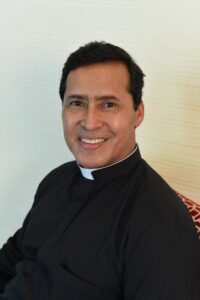 Father Rogelio Landeta
Father Rogelio Landeta
Father Rogelio Landeta grew up in Táchita State in the Venezuelan countryside, surrounded by peacocks, chickens, fruit trees and cattle. At seven years old, his mother sent him to be raised by his maternal grandmother to escape growing tensions in the capital city. On his grandmother’s large property, Father Landeta shared in the care of the animals, was responsible for daily chores as well as schoolwork, and spent the early morning hours at soccer practice. Under his grandmother’s guidance, he learned the value of discipline and a love for his Catholic faith.
“My grandmother was practically an autocrat because whatever she said had to be done. Living with her was an opportunity to share with her and accompany her,” remembered Father Landeta. “We went to church on Sundays and on Mondays, we went to the cemetery. It is a day in Venezuela to visit one’s deceased relatives. She greatly influenced my love of God and respect for people.”
As he approached graduation, Father Landeta had three paths before him: aviation, agriculture, or veterinary medicine. He joined the Venezuelan army and was taking courses on the weekends, when a fourth option presented itself, one he had never considered before.
“Every weekend I always passed by the seminary and asked myself, ‘What is there?’ I learned it was the seminary of Palmira, where the formation of priests occurred,” he said. “I prayed to God for guidance and illumination for the path I should take, so that I would have no regrets. I was called there by curiosity, not because I had a great desire to become a priest.”
After two years serving in the army, that curiosity led him back to the seminary, where he studied philosophy and theology and discovered God’s calling for his life.
“I was fortunate that God had been creating within me a structure; obedience, and discipline. Beginning with my grandmother, later with the army, and then seminary – which was a disciplined environment that required order and obedience, and interior formation. By the time I reached the seminary, I had already formed these habits.”
He was ordained a priest on March 15, 1997 in in San Cristóbal, the largest ordination in the history of Táchita State. Afterwards, his bishop sent him to La Florida, a mountainous community, different from anywhere he had known.
“It was difficult for me, as I had to get out of my comfort zone, yet my teaching and formation as a child freed me from fear of adapting to that type of environment,” said Father Landeta. “Certainly, when you do things with joy you find the simplicity and purity of the souls of the people of the countryside. That is one of the times that strengthened my character, my will and my faith.”
Father Landeta would spend the next 20 years serving at parishes, directing parochial schools and working as a chaplain in the Venezuelan army. When his grandmother was dying, he had the opportunity to offer her the Sacrament of Reconciliation and Anointing of the Sick and then to celebrate her funeral Mass. He calls the experience bittersweet and one of his most formative moments as a priest, but with the passing of his grandmother, Father Landeta decided it was time to go somewhere new.
He arrived in the Diocese of Orlando in 2017 and worked with Father Robert Mitchell at St. Luke Parish in Barefoot Bay to improve his English. In 2018, he was assigned parochial vicar for St. Charles Borromeo Parish in Orlando and since June of 2019, has been parochial vicar of St. Joseph Parish in Lakeland while also serving the Hispanic community at St. John Neumann Parish.
“Coming to the U.S., and to Orlando in particular, has been a blessing,” reflected Father Landeta. “Certainly, it was difficult to immerse myself in a culture different than that of Venezuela, but it is most important for me to do my best and raise on high, not only my country, but my priesthood.”
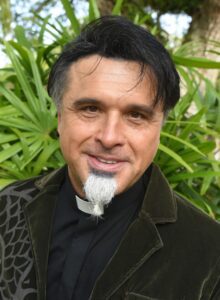 Father Waldemar Maciag
Father Waldemar Maciag
Father Waldemar (Val) Maciag was a self-described “free-spirit”, following his dreams to be an artist and musician at a university in Poland, when a persistent feeling of discontent led him to a retreat at a Carmelite convent. It was there he had a surprising revelation, that God was calling him to a very different life than he had imagined.
“I recall that moment, how I was hit by God saying, ‘I need you.’ That’s when I decided I will quit university. I answered, “Whatever happens, I’m yours now,’” remembered Father Maciag. “It was so unusual for me. I never saw that kind of holiness in me. I looked like a rock star! I had long hair and holes in my jeans! How does this happen?”
Though he never had any aspirations to the priesthood, Father Maciag grew up in a Catholic family in Czestochowa, the spiritual capital of Poland. He remembers weekly Sunday visits to the Shrine of the Black Madonna, attending Catechism classes at his parish, and serving as an altar server nearly every day. Growing up under communism meant that priests were kept under a watchful eye, making friendships with their parishioners difficult -and possibly dangerous. Father Maciag was nonetheless inspired by their holy example.
“In Poland, the priests had to be distant, but they were loving and their spiritual life was incredible. They were brave to fight communism,” said Father Maciag. “My parish priest was incredible. I didn’t get any spoken direction from him, but by his example, without any words, he spoke a lot to me.”
Father Maciag was ordained into the Diocese of Radom in 1997. He served in Poland for three years, when a desire to do mission work led him to Sweden. He would remain there for six years, spending one of those years serving in the Arctic Circle, traveling to celebrate Mass in remote communities and experiencing months at a time when the sun never rose above the horizon. When he spoke to his bishop in Poland about returning to his home country, his bishop had another proposal for him.
“He told me there was a need for priests in Greece, Canada, Ireland, and Orlando. I loved all those places and I don’t like to fight with God so I said I will be waiting for the Holy Spirit to make the decision for me,” said Father Maciag. “Four days later, my bishop called and told me that every place except Orlando was filled. I was going from the dark, cold Arctic Circle to hot, sunny Florida!”
Father Maciag arrived in the Diocese of Orlando in 2005 and has served as parochial vicar at Holy Family Parish in Orlando and St. Paul Parish in Leesburg. He currently serves as the parochial administrator of St. Lawrence Parish in Bushnell. In 2016, he returned to his native Poland to attend the 32nd World Youth Day in Krakow along with a delegation of 45 pilgrims from the Diocese of Orlando.
Father Maciag continues to offer his artistic gifts of music and art through his priesthood. He has had two art exhibits at the Basilica of the National Shrine of Mary, Queen of the Universe and he has created Stations of the Cross and “stained glass” windows for St. Lawrence Parish. As a musician, he continues to write and perform and has even had his music included in feature films. His most recent production, No License, included vocals from four generations of his parishioners.
“The greatest part of being a priest is being a part of something bigger than myself and experiencing all the graces and blessings that come from God,” reflected Father Maciag. “For any person to leave his own country, and go thousands of miles from a loving home, needs the grace of God. On a human level it is impossible!”
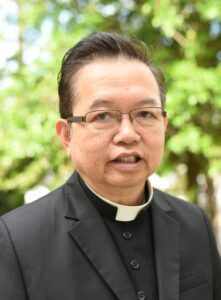 Father Andrew Chien Van Nguyen
Father Andrew Chien Van Nguyen
Father Andrew Chien Nguyen jokes that the saying, “God writes straight with crooked lines” is a perfect description of his vocational journey. Though he knew from an early age he wanted to become a priest, and though he entered the minor seminary when only 13 years old, it would take Father Nguyen 31 years to achieve his dream. De-spite all obstacles, he never lost faith.
“I always offered my vocation to the providence of God, because He always has a good plan for everybody,” said Father Nguyen.
Seven years into his priestly formation at the Major Seminary in HOA Binh Danang, Vietnam, a communist government overtook the country. Though he was allowed to complete his studies, the government refused to give permission for Father Nguyen to be ordained. He returned to his family, his vocation seemingly at an end.
Refusing to be discouraged, Father Nguyen did everything he could to live out his vocation at home.
“Every day I continued to study what I would need to know when I became a priest. I visited Catholic patients who needed comfort in the hospitals. As a catechist, I worked with youth groups. After storms and floods, I worked with the poor to help them survive,” remembers Father Nguyen, “I also had to work to help my family. I did photography for weddings, First Communions, Confirmations and the vows of religious sisters. All these things allowed me to help my family and gave me the opportunity to continue my vocation.”
Finally, after 13 long years, arrangements were made for Father Nguyen to be secretly ordained. But once again, things would not go as planned.
“The night before this wonderful moment in my life, the bishop who was to perform the ceremony became ill and was hospitalized. I still had challenges, up to the last minute!” said Father Nguyen. “I thought it was really the end this time, but in two weeks, I was ordained by that same bishop.”
June 6, 1997, in an underground ordination without any family or friends present, Father Nguyen finally became a priest. Three months later, he secretly celebrated his first Mass for his family. In fact, for the next three years, all of his ministry was carried out in secret. He was unable to do priestly work in the open, but that wouldn’t stop Father Nguyen from serving at every opportunity.
“I celebrated Mass alone every day in my room. Sometimes I prayed the Mass for a small group in a private home. I heard confessions and administered anointing of the sick at people’s homes. I went to them and gave them consolation to soothe their pain and suffering, even secretly,” said Father Nguyen.
Just when his situation was starting to feel hopeless, Father Nguyen was offered a scholarship to study in Rome. Surprisingly the communist government released him and in four years he received his Masters degree in Theology. After completing his studies, Father Nguyen came to United States and in 2006 began working a hospital chaplain and working with the Basilica of St. Paul in Daytona Beach. He served also served as parochial vicar at St. Philip Phan Van Minh Parish in Orlando from 2009 – 2012. He currently ministers as a chaplain for Advent Health Hospital in Orlando and is parochial vicar at St. James Cathedral. He was incardinated into the Diocese of Orlando in 2014.
Father Nguyen’s journey to the priesthood took perseverance, determination, and faith. Even more incredible, he wasn’t the only one in his family to overcome such overwhelming odds. Of his 10 brothers and sisters, one other is a priest and two are religious sisters.
“Looking back over these 25 years, I realize that God never abandoned me. He always followed me, guided me and protected me from all evils,” said Father Nguyen. “Thanks be to God!”
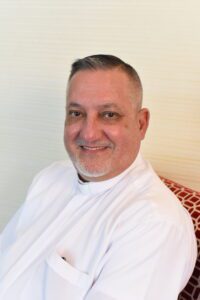 Father Fidel Rodriguez-Cuza, OCD
Father Fidel Rodriguez-Cuza, OCD
A native of Guantanamo, Cuba, Carmelite Father Fidel Rodriguez-Cuza first felt a calling to the priesthood after reading the life and works of Father Felix Varela, Venerable Servant of God, and candidate to be the first Cuban saint. Father Varela’s saintly life inspired him to know more about his life as a priest and his actions in favor of Cuban independence.
“Father Varela was a thinker,” shared Father Rodriguez-Cuza. “He reformed the teaching of philosophy in Cuba as a teacher in the Seminary of La Habana, and all his life was centered in the promotion of the human virtues, and theological virtues in particular. He was a journalist, writer, apostle of the immigrants in the USA and apologist of the Catholic faith.”
Before entering seminary, Father Rodriguez-Cuza graduated from the University of La Habana with a degree in economic sciences and history. He also obtained degrees in Russian and French languages, and as a theatrical and film producer. As a young man, he attended a retreat led by a Discalced Carmelite priest, who become his spiritual director and guided him to discern his vocation to the priesthood. He entered the seminary at the age of 30 at the Interdiocesan Seminary of Saints Charles and Ambrose of La Habana, but life as a seminarian in a communist country was not easy. Government officials tried to prevent Father Rodriguez-Cuza from leaving his job to enter the seminary and then spread false information to his superiors in an attempt to have him expelled.
“It was very difficult for me to live my vocation with the continuous provocations against it,” remembered Father Rodriguez-Cuza. “They were always attacking priests with rumors and lies to make the people lose their confidence and trust in them.”
Despite the obstacles he faced, Father Rodriguez-Cuza persevered and was ordained a priest on April 1, 1997. His first assignment was at El Carmelo Catholic Church of La Habana and as Chaplain of the Discalced Carmelites Nuns at the Monastery of Saints Joseph and Theresa. In 1999, Father Rodriguez-Cuza was elected Superior of the community of Discalced Carmelites religious of La Habana while also serving as pastor of Saint Joseph Parish. Dedicated to the formation of the young religious of his order, he took courses in spiritual direction and formation in both Spain and Guatemala.
In 2002, Father Rodriguez-Cuza traveled to the United States to enjoy a sabbatical year. He enjoyed it so much, he decided to stay and work in this country, first serving in the Archdiocese of Miami. In 2005, he moved to the Diocese of Orlando and served at St. Joseph Parish and Resurrection Parish in Lakeland and Sts. Peter and Paul Parish in Winter Park before arriving at St. Thomas Aquinas Parish in St. Cloud where he has been serving as parochial vicar since 2015.
In 2019, Father Rodriguez-Cuza graduated with honors from the University of Central Florida, receiving a master’s degree in Spanish language and Hispanic-American literature. He has also written two biographical books on Father Varela, the man who inspired his vocation. These books are now being used as part of the process to name him a saint.
“For me the best part of being priest is serving the people of God, helping them to come closer to our Heavenly Father through the Sacraments,” reflected Father Rodriguez-Cuza. “It is so satisfying when a sinner or a person in trouble comes seeking for pardon, for guidance or for help, and after we meet them, they leave with peace, full of the grace of God, happy, relieved and with clear ideas of how to live in the presence of God with a pure heart.”
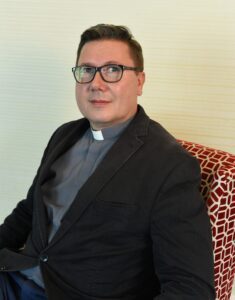 Father Jarek Sztybel
Father Jarek Sztybel
Father Jaroslaw (Jarek) Sztybel was born in Lodz, Poland into a very warm and loving family, the only child of Leszek and Jadwiga Sztybel. He attended Catholic school and entered the seminary immediately following high school, realizing that the priesthood was the best way to fulfill God’s plan for his life. Five years into his formation, Father Sztybel learned about a shortage of vocations in the United States as well as a Polish/American Seminary in Orchard Lake, Michigan. He applied, was accepted, and began his studies in Michigan in 1993.
“It was a period of rapid intellectual and spiritual growth that I considered a great adventure,” remembers Father Sztybel. “Exposure to a new culture and going through the process of acculturation and enculturation had a huge impact on my growth and afforded me new skills and abilities. Through this experience I developed a greater sensitivity to the differences in social and cultural backgrounds.”
Soon Father Sztybel would learn yet another culture, as he traded the Great Lakes of Michigan for the beaches of Florida to complete his pastoral year at St. Ignatius of Antioch Parish in Tarpon Springs. He would remain in Florida and was ordained to the priesthood into the Diocese of St. Petersburg on June 14, 1997.
In addition to his seminary studies, Father Sztybel also pursued a master’s degree in Mental Health Counseling and Family Therapy from Argosy University in Tampa.
“I completed my clinical internship at Metropolitan Ministries, Uplift-U Residential Program in Tampa, where I was providing mental health services to the homeless population. Using my education and counseling skills I have also worked outside of parish ministry in a variety of settings, providing case management and mental health services.”
In 2015 Father Sztybel was assigned to St. Margaret Mary Parish in Winter Park, where he served as associate pastor for three years, while also providing pastoral care to the Polish community at St. Joseph and St. Maximillian Kolbe Parish in Orlando. Father Sztybel was incardinated into the Diocese of Orlando in 2016. He is currently the parochial administrator at John Neumann Parish in Lakeland as well as serving as chairman of the board of directors for Santa Fe Catholic High School and spiritual advisor to the Council of Catholic Women in the Western Deanery.
“My experience of priesthood has been very positive, and I believe that by God’s grace, I have been able to accomplish some good work in this ministry,” reflected Father Sztybel.
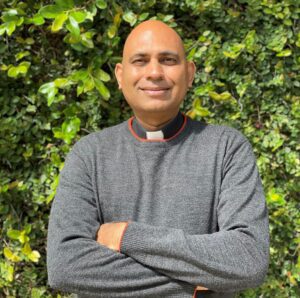 Father Shenoy Thomas
Father Shenoy Thomas
Missionary of Compassion Father Thomas jokes that after his two brothers left the seminary, he was his parents’ last chance to have a priest in the family. Born in Kerala, India, a predominantly Catholic province, Father Thomas was the youngest child with two older brothers and a sister. He remembers evening prayer and rosaries said together as a family as well as weekly Mass on Sunday and attending Catholic school. It was only after he joined the seminary that he knew for sure he wanted to become a priest.
“I was very inspired by my uncle who is a priest. And coming from a Catholic family, there was always a push to become a priest. I really decided during my theology years at seminary, but there was never another profession I even considered,” said Father Thomas, who went on to explain it is very common in India for boys to enter the seminary in high school if they are at all interested in the priesthood. Their discernment happens while pursuing their studies.
He was ordained on April 3, 1997 and joined the Missionaries of Compassion, a religious order that focuses on works of compassion and charity, particularly among the sick and elderly.
“It is about reaching out to people who really need our help. A lot of the elderly don’t get much care and love,” says Father Thomas. “That is the inspiration our founder had, to care for the elderly, reaching out to people with the love and care of Jesus.”
Following Ordination, Father Thomas was assigned to the Diocese of Cape Town, South Africa, where he would remain for 20 years. While there he built a church that helped to unify the community and was appointed the vicar of property for the diocese, but for Father Thomas, being with the people is what stands out the most.
“Just being with the people is always a striking moment, being part of their lives, helping them to worship more and have more faith,” says Father Thomas.
Since 2007 Father Thomas would spend the summers assisting at St. Joseph Parish in Palm Bay. In 2018 he came to serve in the Diocese of Orlando at St. Margaret Mary Parish in Winter Park, where he continues to serve today.
“The greatest blessing of my priesthood is that I can be a link between Jesus and people, just a minor link. I always try to be a consoling factor in their lives. As priests, we don’t solve their problems, but we can make it easier for them,” reflected Father Thomas. “Priests can’t expect to change the world, but we can assist. Priesthood is a joyful life, and we bring that joy of Jesus to others when we celebrate the Mass.”
By Liz Wilson, Special to the Florida Catholic, April 06, 2022

